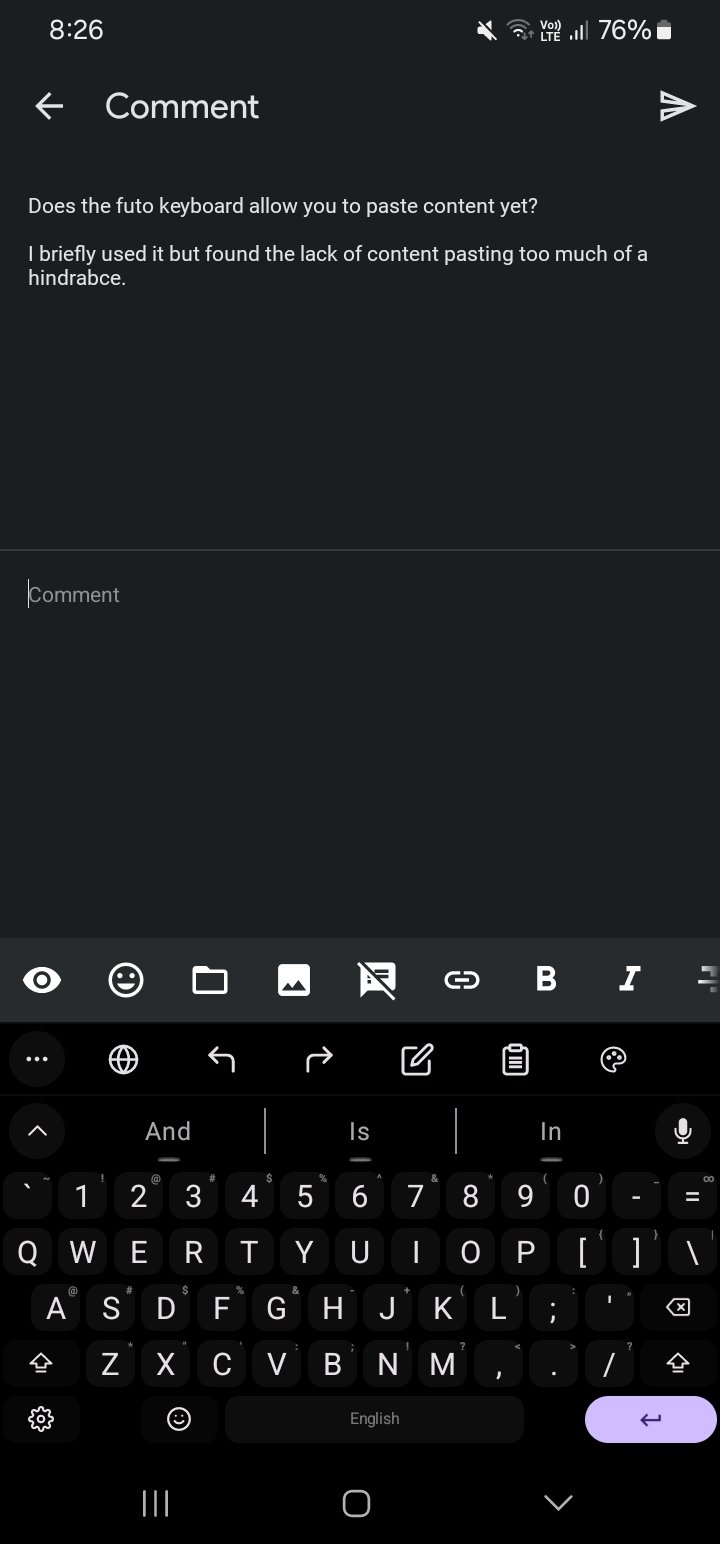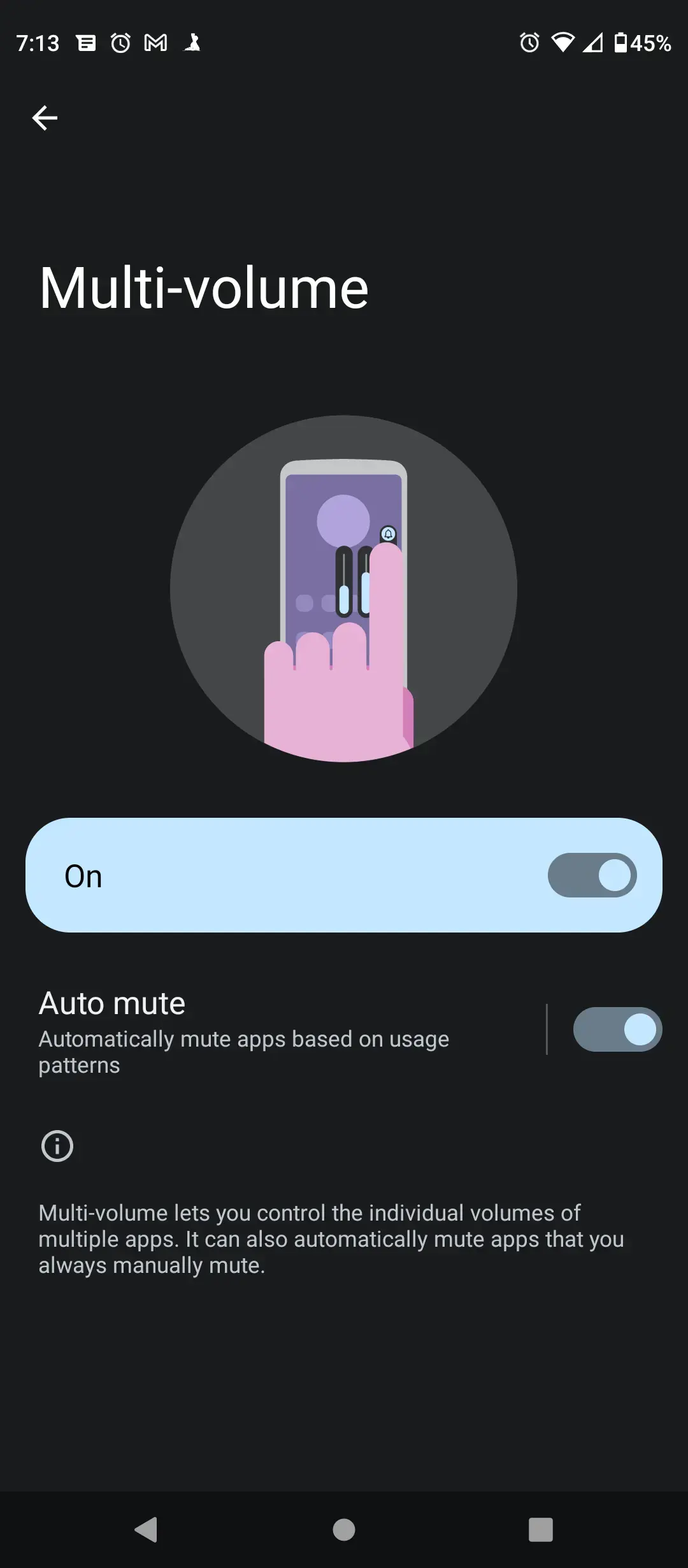Basically, what the title says. Do you use any app, that is proprietary, but either has no OSS alternatives or they’re all not good enough? If there is an alternative, what keeps you from switching?
Shazam (or equivalent)
Hi, thanks a lot, I’ll sure try them both!
My banking app ಠ_ಠ
Not a chance lol but yeah they are a pain in the @ss with all their updates just way too many.
And mine. And probably everyone else’s since the only banking app I can find on F-Droid is something called Varengold.
Bitwarden. Most people think that their application is open source, but more and more of their code has shifted from the GPL/AGPL licensed code to code in their SDK, which is under a proprietary license. This led to their new Android app being disqualified from being hosted in F-Droid repos.
Keyguard was supposed to be an open source Bitwarden client, but the dev chose to use a custom proprietary license, so that is source available as well.
KeePassDxX on F-Droid it also has export function, bit awkward you could call it, but it’s a functioning password storage tool that’s using local storage with your export and import options like to a file or cloud I think as well never used that but think it’s there? It may lack some of the features of say Bitwarden though because I have never used Bitwarden.
Oh!! I didn’t know that … :/
Well fuck me.
I’ve been a paying bitwarden customer for years but i through they were moving more towards free software and not away from it… Makes me consider quitting my subscription. Why do they do this?
Vaultwarden ?
Edit: Nvm, that’s just the server part
That’s actually a good point too: Vaultwarden is fully open source. The official Bitwarden server also has proprietary components.
Yea but I didn’t realize the vaultwarden project didn’t also release client software.
I had looked into running my own vaultwarden, but without open source clients it’s maybe a bit moot. Although I guess the web interface can be considered a client, OS or browser integration is a convenient feature.
Just yesterday I deployed it locally, and was about to migrate from my keepasDX (+syncthing)…
Don’t get me wrong: BW is still a pretty good service, and the proprietary code is still readable by anyone, but the fact that they’re moving a bunch of their previously open source licensed code to something that’s source available is definitely unfortunate.
KeePass, on the other hand, has tons of actually open source clients, which definitely gives them an edge for people that don’t mind syncing their own DB.
They are remaking all apps as native apps so maybe this problem gets addressed too.
Their new, native android app is also using more and more of their proprietary SDK. It’s not something they’re trying to fix.
thanks for getting the word out!
Makes me wish Proton had their own password manager.
I don’t know much about Proton. Isn’t their back end proprietary though?
Proton Pass is a thing mate take a look it might suit your needs
Pedantic, but Google Messages’ RCS. And it’s all Google’s fault because they are holding the API hostage, probably because they want to create familiarity with the app so that people don’t switch once they finally open up.
Not pedantic at all. Google lied about RCS being an open standard.
The pedantic point would be saying that RCS, the protocol, is technically open, but the specific implementation that Google is pushing and being adopted is proprietary 🤓
So yeah. Totally fair point and fuck Google for their RCS bait-and-switch.
For anyone wondering:
RCS
Rich Communication Services. It is a protocol designed to enhance traditional SMS. RCS allows users to send messages that can include high-resolution images, videos, audio messages, and group chats, as well as features like read receipts, typing indicators, and location sharing.
Not just that, but they are actively hostile and hypocritical about it. Every 1-3 months they prevent RCS from working on rooted phones or phones running alternate ROMs. The fact that they spent so much time complaining that Apple wouldn’t comply with the “open” standard while limiting users’ options on their own platform is very frustrating.
I’m glad Google is exposing how crappy RCS is.
It’s been fifteen years, and all they have is a “protocol” that’s still completely dependant on a phone number.
What good is that? Why would I want that?
There are numerous systems that don’t rely on a phone number, e.g. XMPP did everything RCS is trying to do, in 2010 (I ran it on my phone then, with a desktop client that kept in sync).
Teleguard works on every platform, no phone number required, as does MATRIX, Simplex, Wire, Threema, etc, etc.
Not to mention the issues people have with it. It’s unreliable.
RCS is not another chat app.
It’s the NEW SMS. That is why it is so important, and that is why it works ONLY IF YOU HAVE A PHONE. Because that’s literally the point.
Having your mom, grandpa, and everyone automatically use encrypted, modern comnunication just because they have a phone is extremely important.
Realise that in places where SMS has been historically free, SMS is the standard.
XMPP, Matrix or whatever will obviously still have its place for more “incognito” conversations. But having a phone number should also give you access to a better alternative than SMS.
as I understand a phone number “gives you access to” RCS as much as it does to Signal. at that point it’s just about what was pre-installed
RCS is supposed to be a distributed protocol, just like SMS, but using data. It is not the same as Signal. Tho, currently, Google is the main provider for almost all phone companies.
Google Pay/Wallet
Right now tap and pay is completely and hopelessly corporate
The issue is that the digital tap-to-pay cards are actually reissued cards with their own unique numbers. They also require significant security measures to protect from cloning attacks.
So banks need a party that they can safely issue a digital card to, knowing that the card data will be stored safely.
Even a FOSS app that covers all the user’s needs is going to have a lot of trouble actually getting a card loaded into it under current standards.
I hate to say it, but crypto wallets are likely the closest thing we’re ever going to get to a FOSS tap-to-pay system. Banks are inherently corporate and capitalist, so it’s not really in their nature to make things open source.
Perhaps if there were an industry standard for issuing digital cards, instead of banks partnering with centralized wallet apps, we could procure our own digital cards to load onto our phones and watches, or integrate into other devices. But that’s a whole other battle that nobody is fighting right now.
A FOSS app for digital payments, must have a company front to sign deals with country retail store chains. Although customer kyc can be avoided, the payments from the front company to retail chains would be thru a corporate structure.
… maybe convenience is the wrong path
The advantages of PoW crypto, over digital (and PoS), it’s possible to force between seller and buyer:
- communication with end-to-end encryption
- privacy oriented marketplaces
With the goal of fostering our own private communities. Over time, might spawn a sub-culture, identity, and ultimately people hood.
Google Play Services
MicroG works really well
A free-as-in-freedom re-implementation of Google’s proprietary Android user space apps and libraries.
MicroG works well if you let it leak some data to Google.
I would like a free-as-in-free-from-Google Google Play Services reimplementation that lets me use any app that depends on it without hitting any Google server.
OP asked about Open Source not about privacy.
MicroG minimises connections to google servers, here you can read what addresses it still connects to and why: https://github.com/microg/GmsCore/wiki/Google-Network-Connections
Free software (not open-source, it’s really free software that’s important) that depends on a single for-profit vendor is not free.
MicroG is open-source but it’s not free. It fails to address two problems:
- What do I care looking at the source code of a Google Play Services replacement when Google still holds my cellphone by the balls for certain critical functions?
- Why do I need permission from Google for apps to function properly on my cellphone?
I don’t think OP cares about getting the source of the apps they run so much as the apps being free-as-in-libre in his original question. Many people mistake open-source for free software and MicroG is not truly free.
(I reread ops question and I can only see the term open source 2 times, but whatever, I understand what you say, and I don’t want to debate about semantics.)
The point with microG is it’s still the best way if you want to use android. The other options are:
- Play services (GMS), or Huawei has some similar solution because of US trade embragoes.
- You can use android without play services but notifications won’t work for most apps, even if you can open them. (UnifiedPush tries to solve notification part) Wifi and cell based location won’t work
- I see microG as an acceptable middle ground. I still have to give up something to goog, but it’s not much compared to GMS, and I can use all available apps
The point with microG is it’s still the best way if you want to use android.
btw I’m perfectly fine without even MicroG. When I was installing my phone it asked whether I want that too, said no, and didn’t fell the need to then it on yet
Huh? Which rom asks this? Usually you have to go through hoops to get microg, and only a handful of roms have it builtin. It can only ask if you want to enable microg not installing it or not, microg to correctly work it should be installed in
/system/priv-app, to do that after boot on device, you have to be root.Do you use any app from aurora or outside fdroid? If your answer is no, than you can use android without a GMS package.
Also as I wrote, location won’t work for you underground or inside concrete buildings. If you are fine with these kind of limitations than you can obviously.
Marwin (the main developer of microg) said in some interview that he doesn’t want microg to exist, and in a perfect world we shouldn’t need such workaround. I would be also happy if android wouldn’t depend this muhc on google
And maybe tomorrow we’ll see UP grow up, removing one more piece from google. And the day after, another piece.
Dating apps.
We need an open source completely free dating app.
No paying for matches, no limits …just they’re in your town, you look at their photos, you can talk, anyone can block anyone.
I don’t really care for online dating, but I remember coming across this. They claimed to be open source.
I’m honestly pleasantly surprised to see that this project seems to be rather actively developed.
Which is completely separate from having a meaningful user base (near you), so 🤷
Which is completely separate from having a meaningful user base (near you), so 🤷
Yep, this unfortunately seems to be a much hard problem
I’m with you, but see a million obstacles (aka. reasons for why things require payments).
You would need some form of moderation, to weed out illegal content as well as simply bots, spam, and dead profiles. Also for message content. I’ve given it some thought and suspect it can be crowd sourced to some degree, but also needs counter balances. Instead of limiting a profile to be live/banned, you could have a percentage score of peer-reported subjective legitimacy (ditto for message responses, heck you could even have a section of outright reviews of the person’s behaviour - although that, again would be subject to abuse and moderation).
Hosting, traffic, etc. would be an unavoidable cost, but can be mitigated with low resolution photos (VGA should be “good enough” for an initial impression, no?)
For sure, an open source solution would offer way more fine grained filtering.
Great, but creating such an app would require someone to foot the bill for hosting user data, the web app and this can easily amount to quite a substantial sum. Not to mention that supporting this app would also be quite time consuming.
So write it to be decentralized, like BitTorrent or limewire, but for dating.
Then do it yourself if you think this can be done so easily.
i will never understand why people think this is a sensible response, just because someone says “it’s not an unsolvable problem” doesn’t mean they think it’s trivial for a toddler to implement in an evening.
I don’t think it would be easier, I think it’s my answer to the question asked. Look at the post again.
It’s nothing personal dude, it’s just someone’s question on the Internet. The question isn’t about whether it would be easy.
Not to mention you’d need moderation for all kinds of scams or even pedo stuff… It’s a risky one.
Legal waiver (no one under 18) and six picture limit, you can only change your pictures once a week.
@DarkCloud create a Mastodon instance, write your instance rules, moderate. That’s it. Plus you’ll be connected to the whole fediverse, existing client apps will work.
A keyboard with swipe typing, multilingual autocorrect and speech to text support that actually works.
Other than that, my only proprietary apps are from commercial services I use and pay for (banking, Spotify, Carsharing and public transport). I’d love for them to become open source, but it’s probably not ever gonna happen, cause they rely on verifying my identity.
I’ve had a good experience with HeliBoard
Japanese has been an open issue for months now, so it’s a nope from me.
X2. I don’t like it, but I still use that libswype Google blob to get swipe-writing. I wish they could produce their own in the future.
I went with FUTO Keyboard. It’s the only keyboard that ticks all my boxes to replace GBoard so far.
I wish the swiping predictions were a bit better though.
FUTO keyboard is proprietary.
It is not open source, because it does not meet the definition of open source.
If the license doesn’t meet the OSD and does not protect four freedoms, then it is not open-source.
Jokes aside, I find that attitude not very healthy. Whether you want to call it open source or not, as I said, it’s far from proprietary, and certainly more than just source available. Dismissing it for that reason is quite unreasonable.
FUTO changing the definition of open source to suit their business model is like that time US Congress decided that pizza was a vegetable because it has tomato sauce.
FUTO’s EULA may superficially resemble a true free software license (and may be good enough for you, personally) but it fundamentally undermines core tenets of the free software movement in order to preserve their business interests. All pseudo-FOSS licenses (whether of the “ethical” or the “business” variety) do this, because they prioritize the interests of the rightsholder above those of the community and the user. If important free software projects like Linux and Firefox were released under this license the free software world as we know it would not be possible.
As proprietary licenses go, it’s certainly far from the worst.
That was silly yeah because a Tomato is a fruit not a vegetable lol
Jokes aside, I find that attitude not very healthy.
Calling a source-available license “not proprietary”, this is what not very healthy.
“Source-first” or “fair code” are just a fancy ways to say “proprietary”.
Does the futo keyboard allow you to paste content yet?
I briefly used it but found the lack of content pasting too much of a hindrabce.
Has options for pasting, and even a clipboard history feature? Although have not enabled that or tested it.

By pasting content, I meant pasting images. I’ve just checked it and it doesn’t do it yet. I often will take a screenshot but only copy the image because saving it pointless.
Have you tried openboard? Admittedly it doesn’t the text to soeech
yes, tried it.
HeliBoard in combination with FUTO Voice Input is recommended. Unfortunately, the word prediction isn’t too good.
@Kasupke are we recommending proprietary software here in the open-source lemmy community?
I’m not sure if this fits but here is mine:
I want to get away from Samsung but the “Sound Assistant” app let’s me control the volume of every app, kind of like a mixer. Sometimes an app doesn’t have a mute option, I can set the volume of that app to 0 without effecting the volume of whatever music I’m listening to.
I also like to listen to my local police scanner and music at the same time. I can set the volume of the scanner app low enough to not really bother the music but loud enough that if something happens I can still hear it and pause the music.
I can’t believe Samsung and their app is the only way, but I haven’t found an alternative.

My Motorola has it built into the sound settings so you should be able to find other alternatives
Good to know, thank you for the heads up.
I’m using audio changing Magisk mods on my phone, and recently stumbled upon an issue (already fixed by a setting) that made me realize that audio mods work on an app-by-app basis.
The reason I wanted to tell this is if you are fine with tweaking your phone a little, an audio mod could do what you need.
A quick search has shown me these:This is something I’ve taken for granted as per app volume control is integrated into the OS on Motorola phones and I’ve been using mid range Motorolas since the Moto G 4 in 2016 (they offer a reasonable price, reasonable performance, microSD card and headphone jack).
Then I was setting up a Samsung tablet last weekend and was horrified to see I had to use the Samsung store to download Sound Assistant for something I had just assumed was a standard OS feature for close to a decade.
I’m not super well versed in the world of app development, but I would assume due to the way apps are sandboxed, this isn’t something that could be done with a third party app.
system apps can do it. android has an API for audio mods that allows such things
Right, that’s what I meant when I said “third party app”. Samsung can write an app to do this, but your average app installed from the play store likely cannot.
you can have third party apps as system apps. you can even write your own, but the API docs are somewhat harder to find. nowadays you install them with magisk modules (not all of them contains an app), so that it is easier to revert and also to hide from those looking for it with a bad intent
There are so many. By usage however:
Smart Audiobook Player: None of the apps I tried had all the features in one, like reading my complex audiobooks folder structure and auto grouping the books based on that. Timer to pause audiobook that is automatically reset by moving the phone.
Maps: No foss solutions work better where I live than GMaps
YTMusic: So this is a tough one to beat because of the nature of the platform itself.
Notes: I am looking for a P2P syncable note app that can also have a web interface or atleast a Linux version of the App. Allows drawing your notes on an android phone or tablet using stylus, and other usual features. Can also use cloud storage as a backup or sync source. I know this one is a really tall order.
OSMAnd works really well. For YTMusic, you can instead pick LibreTube and use it in music player mode.
If you live in an area that’s missing the data, it doesn’t matter how good the app is. I regularly upload in my area, but it will be years before it is reliable as a primary app. I usually search in Organic Maps first, then in Google Maps. OSM gets me where I need about 10-20% of the time at most. Google Maps is about 99%.
There are multiple front-ends for YT Music. Song Tube is good, Libre Tube is good, Inner Tune, Musify, Vibe You, etc. I haven’t used them all so I can’t testify to them, but it is a deep bench.
There are always people claiming Organic Maps or other OSM apps are perfect replacements for GMaps and I’m just curious what other tool these people were using for location based searches. Because it apparently wasn’t GMaps?
If you live in a big liberal city with a lot of tech people, then you probably have a really well organized team creating detailed maps. In that case, there’s no reason to think that Google is any better than osm. In a lot of cases it’s worse, especially for walking and cycling.
If you’re in a smaller, poorer city or a rural area, there’s a good chance that 80% or 90% of the addresses are just not there yet. Compare this random park in Berkeley, CA with labels for individual trees to this neighborhood in nearby Stockton, CA, which is assuredly more than 3-4 houses.
OSM usability really depends on where you live.
OSMand is amazing for the most part but trying to locate a business is next to impossible. Then if you do, the store hours are either not there or incorrect. I’m trying real hard to make it my primary map app but too often I find myself having to open google maps in the end.
Edit: They also combined Caravan POI’s with Tourist destinations, which really really fucked things up for people wanting to just see those and not thousands of other locations they want nothing to do with. Why are churches also mixed in there too? Makes no damn sense.
They also combined Caravan POI’s with Tourist destinations, which really really fucked things up for people wanting to just see those and not thousands of other locations they want nothing to do with. Why are churches also mixed in there too? Makes no damn sense.
You can edit those out, though I agree them being there by default is fucking stupid, full stop
Yeah, Osm is really good where I live, actually sometimes better/more up to date than Google Maps but finding businesses is more difficult.
I resolve this for my self by going to the website of the business, finding the address and putting it manually into Osm. Yes it’s more work but it works and is worth it for me.
I use OSMand alongside GMaps WV (a webview for Google Maps, wipes all data automatically after closing). Works well enough for me, but in GMaps you can’t rotate the map or provide your location
@Sir_Kevin Have you ever corrected the incorrect store hours?
Not while driving a 30 foot RV in the middle of the night, no.
@Sir_Kevin missing the point on purpose?
Yes you’re missing the point. If I’m on the freeway in the middle of the night and take an exit to some town I’ve never been to only to find out the location is closed the app has failed. I needed accurate information in that moment. Not years later when the community gets around to correcting the hours. I absolutely need to be able to depend on the data the app is presenting. If I can’t I’m not going on a crusade to fix all the errors, I’m using a different app.
@Sir_Kevin I never said “Have you ever corrected the store hours while driving off a highway in another city” - obviously that would be a stupid question, don’t assume I’m stupid. I asked if you ever came back home, rested in front of Netflix and opened the app to update the store hours that you noticed during the day - because that’s the only way they will be updated, and if you aren’t doing it, then somebody will have to do it for you, so you owe them.
I’ll mention organic maps and rimusic.
There’s a lot of FOSS music apps that just use YTMusic, like ViMusic or the ones other people mentioned in their replies. For maps, I use Organic Maps, the only thing I feel like is missing from it is traffic jams but I think you can see why that would be hard to add. It does have features that Google Maps doesn’t have tho.
For ytmusic you can try innertune
Logseq and syncthing could work for your notes. Logseq has a whiteboard feature that can be used with a stylus, and syncthing is p2p.
I use audiobookshelf. You need to have some (self hosted or not) server to use the client, but I find that software incredibly well made.
Symfonium. There are plenty of music apps, and I’ve used a lot of them, but none combine the UX and functionality that Symfonium offers to anywhere near the same quality :/
You know? Doesn’t look like it’s quite there, but it’s the closest I’ve seen by far, I’ll have a good look I think! Thanks for that!
Edit: Tempo has Podcasts, Symfonium does not. Time will tell, but that may be the feature that pushes me over the edge.
yea considering its FOSS it was good enough compared to a lot of the other clients for me to move away from Symfonium
I was so pissed the other day while pulling out of the driveway that my paid copy of Symfonium wouldn’t work at all. It needed permission from daddy google to start but didn’t have an internet connection at the moment. Fuck that shit I gave you my money!
Synfonium is the only thing that I could get to work with my selfs hosted jellyfin server and with downloading of music. I haven’t had any problems with it though.
Tasker: I haven’t used it, but I’ve seen useful automations over the years from people online and I would probably use a good FOSS alternative.
I use “Automation” (on fdroid) - the UX could do with some improving but it thoroughly covers the basics.
Newer versions of Android make it difficult to automate certain things though, I find root helps to get around that in some cases
I used to be a heavy Tasker user. I think I hit a wall with building more complex rules using their interface, which made me stop using it. Maybe they have a way to just write a script instead now, but I haven’t looked into it.
There is something called auto clicker(?) Such is simpler but similar. It’s on fdroid.
Whatsapp. I know signal, simplex, matrix, (a billion other things), etc exist that are much better, but where I live, no one uses them, for context, basically everyone, like if you have a phone, you use whatsapp, some government things even happen through whatsapp bots, when people say the word message here, they mean whatsapp. There are about 20-30% (among younger folks) who use telegram, but that is mostly for easier piracy, and larger file sharing (before whatsapp allowed 2 GiB, now they do it habitually). My mom has about a 1000 contacts, and less than 10 of them actually use signal (there are many more who signed up(there was another thing, basically when elon said “just use signal”))
At this point it is not worth getting everyone to switch, the best i have done, is just reducing the number people i communicate with (on whatsapp), and try to just meet in person
I use Matrix with a WhatsApp bridge. Best of both worlds.
Which bridge do you use? do you self-host it?
mautrix-whatsapp and, yes, self-hosted.
Is there any way i can host the whatsapp bridge but not the matrix instance itself, or something simpler. Even then, it does not really make my situation better. It would be adding one more layer between me and whatsapp, but not much more. As I understand, bridges help when you have multiple platforms, and you want to have one way to access them all, for me, only benefit would be the client would be free
I’m currently on holiday in Croatia and my car rental company, one apartment as well as one tour guide have communicated/provided info through WhatsApp.
signal has proprietary blobs, you want Molly-FOSS
I personally do not use them anything else now, i do have element installed, but when you have no one to talk to, you might as well write messages in a notepad
Honestly, Google Keep notes. Trilium server runs as a UWA on Android but it’s pretty ass. And things like Obsidian are way too much for something me and my (non-technical) SO use to share notes
Obsidian is not open source any way
Quillpad. It looks and feels like Keep, but sync to nextcloud
X2. Great note-taking app.
Agreed. Plenty of notes apps; none with decent collaboration features.
Nova launcher.
I Haven’t found one that works so well with KLWP or has good app drawer organization. I like having folders and tabs to split everything up. Having one big list of apps (70% I dont use often and another 10% bloat) isn’t useful.
fwiw lawnchair beta works absolutely fine for me, i guess it can’t do anything fancy with the app drawer but like, that’s why you have a home screen…
I tried, and tried to like it. We all work differently. I like widgets on the home screen, swipe up for apps. I guess it’s the “start menu” mentality.
I’ve used several launchers but there seems to be a halt developing them. For the most time, I used to use recently Neo Launcher, but it feels dated now, they are working on a rewrite and it’s still beta (if not still alpha). Kvaesitso is a good launcher, but I’m too accustomed to the swipe up gesture to show apps and Kvaesitso just decided to make it upside down for me, and it feels odd even if you can change this to your preference. Finally, KISS launcher, which had halted development a bit but I find light and customizable enough. Not gonna lie here, as soon as Neo launcher gets to a stable state, I’m coming back.
Edit:
I wanted to mention a couple of killer features of KISS that you might probably like:
- Its dock can pin a couple of apps and have some spaces changing depending on the frequency of use.
- You can have a list of frequently used apps associated to a gesture (I use swipe-up and single-touch).
- If you are gonna use a not too frequently used app, you can have a gesture for this too (I use long-touch).
- Everything, and I mean EVERYTHING, is searchable. Well, not everything, but they surely allow you to search a lot of things.
I recently switched launchers. Have you tried Kvaesitso? It’s the best I’ve tried. It allows you to create categories in your app drawer, and organize that way. I’ve really been liking it.
Thank you for your suggestion.
Having just tried it, it is not for me. The categories is there, but having the search/app drawrr on the top won’t work me, especially with these stupid large phone everyone makes. (I’m guessing theres a way to change it, but I didnt get that far)
The ultimate reason its not for me is how widgets are a scrolling thing. It’s a different idea, but I like the widgets on my home screen where I can passively see them.
If there’s a way to change that, I didnt see it. I didn’t even find a way to get rid of the big clock at the bottom.
We need a NOVA replacement with how they’ve recently restructured the company. It looks like NOVA is getting squeezed for the last few cents they’ve got to offer by whom ever bought the company 1-2 years ago.
I’ve tried every other launcher I could find. In my opinion they all seemed to be minimalistic by design or they just lacked features.
Same. I’ve been attempting to de-Google and stick with FOSS where possible, but only Lawnchair has come close to Nova Launcher, but it’s not without its limitations like setting a primary home screen, and better widget padding and removing round corners.
I’m still experimenting with others, but many are no longer under active development either.
@FuryMaker @helpImTrappedOnline
nova launcher has been the last app without foss replacement for me until I found neolauncher.
Using the option ‘categorize apps as tabs’ I have the great drawer behavior as with Nova.
Though development is slow, you can get in contact with them on the matrix channel.
(Oh, just remembered that I still have one non foss app for my Yamaha receiver)
Cool, first impressions are pretty good.
It took a minute to find, the play store has some not free thing. But I found the github page.























